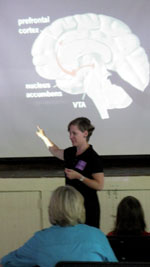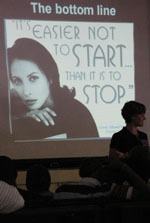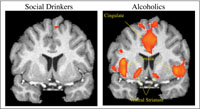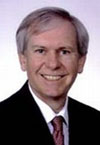|
|
|

|
CDAP uses outreach to
confront addiction
|
by Dawn Brazell
Public Relations
Suzanne Thomas, Ph.D., lifted a dripping brain out of a bucket to the
fascination of many of the fifth graders gathered at Whitesides
Elementary School in Mount Pleasant to learn how alcohol and drugs can
affect the brain.
 Whitesides
Elementary students react to seeing a brain shown by Dr. Suzanne
Thomas, who was there as part of MUSC's outreach program called Just
Say Know. Whitesides
Elementary students react to seeing a brain shown by Dr. Suzanne
Thomas, who was there as part of MUSC's outreach program called Just
Say Know.
They filed past her table looking at the grooves and folds on the
cortex, a few averting their eyes in revulsion. But whether they could
stomach looking or not, they all had gotten the message—that the brain
is an organ of the body affected in powerful ways by lifestyle choices.
That makes Thomas, program director of the Just Say Know program
of the Center for Drug and Alcohol Programs (CDAP), very happy.
“Research on addiction has resulted in remarkable new knowledge in the
last 20 years—truly fascinating stuff. And yet, drug and alcohol
prevention efforts in our schools have remained relatively unchanged
during this time,” she said.
Raymond Anton, M.D., Distinguished University Professor and CDAP
director, said that many people continue to believe that addiction to
alcohol and other drugs is a moral failing. Contrary to this popular
belief, scientific research, especially in the last 10 years, has shown
that addiction is definitely an acquired disease of the brain with
genetic and environmental risk factors. Over time people lose control
over their intake because of specific brain mechanisms are “hijacked”
by alcohol or other addicting substances, he said.
 This is an
area of ongoing
research at MUSC. Recognized internationally
for its discovery of advanced treatment options, CDAP uses the latest
tools, such as brain imaging, genetics, behavioral pharmacology and
medication therapies to provide a greater understanding and better
treatments for alcohol and substance abuse. This is an
area of ongoing
research at MUSC. Recognized internationally
for its discovery of advanced treatment options, CDAP uses the latest
tools, such as brain imaging, genetics, behavioral pharmacology and
medication therapies to provide a greater understanding and better
treatments for alcohol and substance abuse.
Dr. Suzanne Thomas
uses motivational and scientific slides to teach children how to better
safeguard their brains.
 A division
within the Department of Psychiatry, CDAP oversees the
Alcohol Research Center, which is one of only 15 alcohol research
centers in the country funded by the National Institutes of Health,
said Anton. It’s one of the few that focuses on medication development
for treatment of alcoholism. A division
within the Department of Psychiatry, CDAP oversees the
Alcohol Research Center, which is one of only 15 alcohol research
centers in the country funded by the National Institutes of Health,
said Anton. It’s one of the few that focuses on medication development
for treatment of alcoholism.
Anton sees the advances in addiction research as having power to lessen
the stigma that poses a barrier to treatment.
“We need to let people know addiction is a brain adaptation to these
substances and it is not a moral failing. We’re finding in neuroscience
that there are brain mechanisms behind addictions and because of that
people shouldn’t give up hope. It doesn’t absolve them from getting
treatment, particularly if they’re harming people around them, but it
doesn’t mean they’re no good and less worthy than others. It’s just
that they have an illness.”
That’s the message Thomas is getting out as well, especially since
research is finding that alcohol can damage the developing brains of
adolescents and young adults, which are more susceptible to its effect
than the developed brains of adults. The outreach component is a way to
take what’s being learned in the laboratory, and in clinical trials,
and translate it to the community, said Thomas. She wants to see a
shift from the fear-based tactics that have been used in the past to a
more scientific approach.
“In the long run, I think fear-based tactics to discourage drug and
alcohol use are not the best approach, and that’s the basis of our Just
Say Know program. It tells students the whole truth—good and bad—about
the effects of drugs and alcohol.”
 These fMRI scans
help researchers see the craving centers of the brain. Researchers are
investigating how medications could affect or diminish brain
activation, thus reducing cravings for those who suffer from alcoholism. These fMRI scans
help researchers see the craving centers of the brain. Researchers are
investigating how medications could affect or diminish brain
activation, thus reducing cravings for those who suffer from alcoholism.
Research shows that before students graduate from high school, most
will have tried drugs or alcohol. If they have only heard one side of
the story—that drugs and alcohol are bad and can ruin their life—it’s
difficult for them to reconcile how an experience that is quite likely
pretty pleasurable socially or physically can be “all that bad,” she
said. That’s why the outreach program explains to students how drugs
and alcohol affect the brain, both in the short and long term.
The program, which has reached about 3,500 students since it started 10
years ago, will be expanded in the fall by partnering with MUSC Gives
Back. Thomas will be training MUSC students to be volunteers,
which will enable them to provide the program to more schools. It also
is an excellent training tool for the medical students to learn more
about research at the university, she said.
“This is a win-win situation—CDAP can accommodate more requests from
local schools, and MUSC students get to give back to the community and
inspire young minds.”
Thomas said that some of the most important discoveries about addiction
have been made by MUSC faculty. “Our outreach efforts have one
overarching goal—to explain to non-scientists how addiction research is
advancing our understanding of a devastating disease. With our outreach
efforts, I think we can, one person at a time, change how people view
addiction and addiction treatment, and convince them how our research
is critical for effectively preventing and treating addictive
disorders.”
To learn more about CDAP’s current addiction research and ongoing
clinical trials, visit http://www.cdap.musc.edu. For information on Just
Say Know, call 792-2727.
In the News
MUSC's Center for Drug and Alcohol Programs (CDAP) earned top marks for
drug and alcohol abuse medical education in U.S. News Media Group’s
2010 edition of America’s Best Graduate Schools.
The ranking comes from the collaborative efforts of CDAP, the Division
of Clinical Neuroscience in the Department of Psychiatry, and Addiction
Neuroscience faculty in the Department of Neuroscience, which ranked
MUSC in the top 10 academic institutions for its educational and
training efforts in alcohol and substance abuse for 2011.
 Dr. Raymond Anton,
M.D., Distinguished University Professor Dr. Raymond Anton,
M.D., Distinguished University Professor
CDAP director
“We are honored to be among the nation’s top institutions that were
selected as the best in training the next generation of addiction
researchers and clinicians. This is a great honor for our
well-recognized faculty and a tribute to their work, which attracts
many of the brightest new trainees to initiate their careers here at
MUSC under their mentorship.”
Friday, June 4, 2010
|
|
|




 This is an
area of ongoing
research at MUSC. Recognized internationally
for its discovery of advanced treatment options, CDAP uses the latest
tools, such as brain imaging, genetics, behavioral pharmacology and
medication therapies to provide a greater understanding and better
treatments for alcohol and substance abuse.
This is an
area of ongoing
research at MUSC. Recognized internationally
for its discovery of advanced treatment options, CDAP uses the latest
tools, such as brain imaging, genetics, behavioral pharmacology and
medication therapies to provide a greater understanding and better
treatments for alcohol and substance abuse. A division
within the Department of Psychiatry, CDAP oversees the
Alcohol Research Center, which is one of only 15 alcohol research
centers in the country funded by the National Institutes of Health,
said Anton. It’s one of the few that focuses on medication development
for treatment of alcoholism.
A division
within the Department of Psychiatry, CDAP oversees the
Alcohol Research Center, which is one of only 15 alcohol research
centers in the country funded by the National Institutes of Health,
said Anton. It’s one of the few that focuses on medication development
for treatment of alcoholism.
